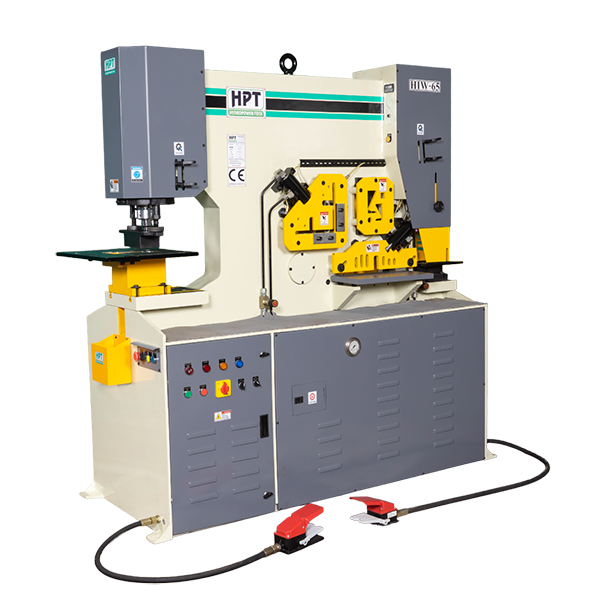Introduction
Structural steel is at the heart of modern construction—from bridges and towers to industrial plants and warehouses. But to turn raw steel into functional components, fabrication shops must work fast, precise, and cost-effectively. That’s where ironworker machines come in.
For years, the ironworker machine for structural steel has been a workhorse in fabrication facilities across the globe. These machines combine multiple metalworking operations—like punching, shearing, and notching—into one compact, powerful solution. In this blog, we’ll explore how ironworker machines simplify structural steel fabrication, reduce costs, and enhance production efficiency.
The Demands of Structural Steel Fabrication
Fabricating structural steel components isn’t just about cutting and welding—it’s about doing those tasks at scale, under pressure, and with pinpoint accuracy. Beams, angles, channels, and plates must be processed with minimal waste and high repeatability.
To meet these demands, fabrication shops rely heavily on specialised structural steel fabrication equipment. These tools must handle thick, high-strength materials and support a variety of operations without slowing down production. Manual tools and separate machines for each task can quickly become bottlenecks—this is where an ironworker earns its value.
What Makes Ironworker Machines Ideal for Structural Steel
An ironworker machine for structural steel combines multiple functions—punching, shearing, and notching—into a single hydraulic-powered unit. This not only saves space on the workshop floor but also cuts down the time and manpower needed to switch between machines.
Here’s how each function helps streamline structural steel fabrication:
1. Punching:
Quickly create bolt holes or connection points in beams and plates with no need for drilling. This is essential for base plates, gusset plates, or truss components.
2. Shearing:
Trim angle irons, flat bars, or even heavy channel steel to length with smooth, clean cuts—without sparks, grinding, or secondary finishing.
3. Notching:
Prepare corners and joints for welding or fitting, allowing beams and angles to connect seamlessly in structural frames.
Each of these tasks can typically be performed with different metal fabrication machinery, but having all three in one hydraulic ironworker for steel speeds up the process significantly.
Key Benefits of Using Ironworker Machines
Let’s break down the exact benefits of using an ironworker machine for structural steel fabrication:
1. Faster Throughput
Switching between tasks—like cutting, punching, and notching—is quick and seamless. Instead of walking between machines, workers stay at one station, reducing idle time and boosting throughput.
2. Improved Accuracy
Hydraulic-powered tools ensure consistent force and repeatability. This minimizes human error and ensures components meet exact specs, which is crucial for safety in structural builds.
3. Space-Saving Setup
Rather than filling your shop with multiple single-purpose machines, one compact hydraulic ironworker for steel can handle it all, perfect for shops with limited space.
4. Reduced Labor Cost
Ironworkers are simple to operate and require minimal training. One machine, one operator, multiple functions—meaning fewer staff needed for more work done.
5. Long-Term Cost Savings
By consolidating tasks into one piece of metal fabrication machinery, you reduce equipment maintenance, lower your energy use, and extend the life of your tools.
Choosing the Right Structural Steel Fabrication Equipment
Not all ironworkers are created equal. If your shop handles thick plates or high-tensile steel, you’ll need an ironworker machine for structural steel that’s up for the job. Look for machines with:
- High punching and shearing capacity
- Heavy-duty frames and toolsets
- Versatile attachments for notching and bending
- Durable hydraulic systems
HPT’s range of hydraulic ironworkers for steel machines is specifically designed for heavy-duty work in structural applications. Whether you’re working on I-beams for bridges or angle iron for industrial framing, these machines deliver the force, precision, and reliability you need.
Real-World Use: How Fabricators Benefit
Let’s take a real-world example. A mid-sized fabrication shop working on industrial sheds needed to process thousands of angle and flat bars weekly. They were using separate metal fabrication machinery for cutting and punching, which slowed their workflow.
After switching to a single hydraulic ironworker for steel, they reduced setup time by 40%, cut material waste by 25%, and nearly doubled their daily output. The return on investment? Less than six months.
It’s not just about doing things faster—it’s about doing them smarter. With the right structural steel fabrication equipment, shops can take on larger projects, meet tighter deadlines, and increase profitability without increasing labor or space.
Tips for Getting the Most Out of Your Ironworker
If you’re planning to invest in or upgrade your ironworker machine for structural steel, here are a few quick tips:
- Train your operators well: Even the best machine underperforms if not used correctly.
- Use quality tooling: Long-lasting punches and blades reduce downtime and improve cut quality.
- Stick to a maintenance schedule: Hydraulic machines require regular inspection to maintain force and performance.
- Invest in attachments: Pipe notchers, press brakes, and bending tools expand your machine’s capabilities even further.
Conclusion
In a competitive industry like steel fabrication, every second and every cut matter. An ironworker machine for structural steel brings versatility, speed, and precision to your workflow—all in one machine. Instead of juggling multiple pieces of metal fabrication machinery, shops can rely on a single, high-performance unit that delivers consistent results across a range of applications.
Whether you’re a small shop looking to scale or a large fabricator seeking efficiency upgrades, choosing the right hydraulic ironworker for steel can transform your output. At HPT, we understand the demands of structural steelwork, and our machines are built to meet them day in and day out.
Explore our range of structural steel fabrication equipment and discover how HPT can help you work smarter, not harder.

